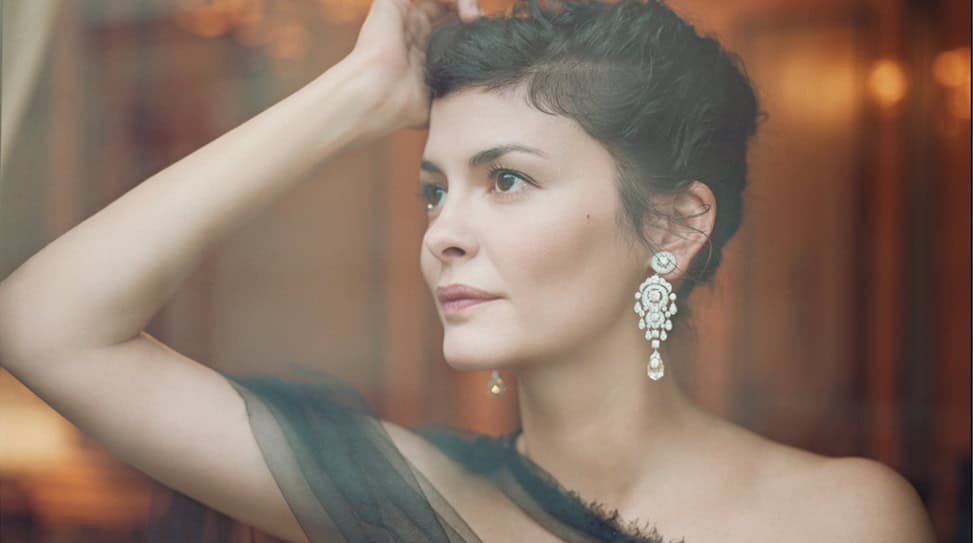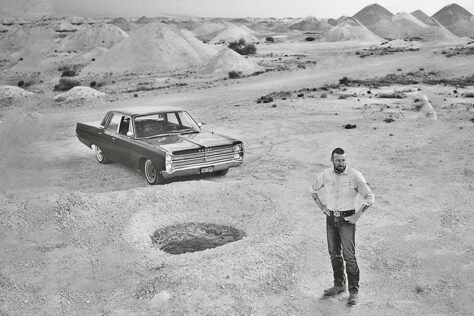It would be very pretentious of me to talk about that.
There is something terrifying about meeting your idols. The risk that years of pleasant illusion will shatter around you is not something you take on lightly. And when someone is billed as “one of the most beautiful” by People magazine, all the alarms go off at once. When we meet Audrey Tautou in her suite at the Empire Hotel in New York City, sweaty palms were the least of our worries. Luckily, superseded by her radiant smile and genuine enthusiasm, it lasted mere moments.
She might be one of the best living examples of a contemporary icon. Named after the great Audrey Hepburn, Tautou has become a household name in her own right. Jean-Pierre Jeunet’s Amélie fast-tracked the French actress to global megastardom in 2001. Many films later (including a Hollywood turn alongside Tom Hanks in Ron Howard’s 2006 hit The Da Vinci Code), the 33-year-old is now returning to the screen doing what she does best.
In David and Stéphane Foenkinos’ Delicacy (an adaptation of the best-selling novel La délicatesse), Tautou is fittingly cast. Like Amélie, Tautou has a quietly tough demeanor as Nathalie. The charming adult fable follows a woman trying to piece together her life after the loss of her husband, including embarking on an unexpected affair with a co-worker. As it turns out, our appetite for Tautou-driven romantic comedies were far from sated…
Delicacy hits select theaters this Friday.
Are you enjoying New York City?
I love it! I lived in New York City for six months when I shot a movie here eight years ago. I loved this city so much that I could imagine myself living here. Each time that I come back, I fall in love with it all over again.
What was the movie that you shot here?
It was a movie directed by Amos Kollek. I don’t know if you saw Sue Lost in Manhattan… I wasn’t in that one, but he also directed Happy End. Justin Theroux was also in that.
Let’s start off with Amélie. It always comes back to Amélie.
Of course!
How pivotal, really, was your role in Amélie in shaping the course of your career? Did you see things change drastically right away?
It happened almost overnight. Everything was different after Amélie. You suddenly become well-known. People look at you in a different way. It really changes your day-to-day life. It changes how people perceive you and how they interact with you. So, it did have a big effect.
Did you continue getting similar offers after that?
Well, it’s easier to market films like that because of Amélie. Actually, I think that Coco Before Chanel, which was done not too long ago, did really well in the States and abroad. So I don’t think it reflects so much on whether it’s a film like Amélie, but if the film is of good quality, it will be more marketable.
Is there a kind of role or a genre that you would like to explore, but maybe haven’t had the opportunity to yet?
My desire has already been fulfilled because I just finished working on a film with Claude Miller. In this film, I play a much darker character than any other character that I’ve played before. The character is much more psychologically complex. It was a totally different thing for me to do. I think it’s normal for people who saw me in Amélie to expect to see me in that kind of role again. Even if a given role is different, which it is in Delicacy, it’s something that has more emotional depth to it. It’s hits the kind of register that people aren’t used to seeing in my movies.
You bring up Coco Before Chanel. How much pressure is involved when you’re trying to replicate an icon of that stature who lives in our collective consciousness?
Since I was playing Coco before she became Chanel, before she became this icon that everybody knew, it was actually a much freer thing for me to do. I had a lot more latitude in the way that I interpreted who she was, perhaps because she wasn’t familiar to us prior to this fame. I was playing her when she was still a work in progress rather than a fully developed person that everyone knew. Maybe that made it a little bit easier. The only scene where I felt a lot of pressure was the very last scene where you see Coco on the staircase because it’s in that moment that she becomes Chanel.
You were the face of Chanel around that time as well. Did the movie have anything to do with your obligations to the brand?
No.
So it was purely coincidental.
It was absolutely coincidental. It’s kind of funny because it seems like it should have been something that was required in order for me to play that role. [laughs.]
What was it about Delicacy that piqued your interest?
What really attracted me was the whole palette of emotions and colors that this character represents. You see her in her youth and you see her in a time when things are very traumatic. You experience her suffering and you see her strength. You see her dignity. You see her come to life again. It was a range of colors and emotions that attracted me to this character.
Were you familiar with the novel prior to coming on board the project?
No, actually. I hadn’t read it. It wasn’t this phenomenon yet. It wasn’t a best-seller when we were developing the movie. It was only after we started shooting that the book took off.
It’s usually the other way around.
It’s funny! It’s really unusual. We didn’t make this movie because it’s a best-seller. One of the two directors is the actual author of the novel, but he wasn’t the one who wanted to make a movie out of it. It was his brother who pushed him to do it. The actual author who became one of the directors really saw that there was an interest.
What are some of the challenges and/or advantages of working with two directors?
These two brothers became one voice, ultimately. It’s an amazing thing to be able to work with the author of the book because there’s absolutely no discussion involved. He’s the one who gave birth to the characters in the first place.
I don’t know where you are in terms of production, but you’re attached to a Michel Gondry film. What can you reveal?
The film hasn’t stated shooting yet. We’re going to start shooting at the end of April. It’s an adaptation of a book by Boris Vian and we don’t know what the exact title is yet. I think it’s going to be called Mood Indigo. It’s a crème de jour. It was written years ago, but when you read it, you see that it was almost as if it was written for Michel to turn it into a movie.
What have you learned from acting over the years that you could never have known prior to actually doing it?
Since the very beginning?
Yeah.
You know, for me, everything was new and everything was unexpected. I think this is the kind of profession where you’re always learning something new. I can’t really say because I didn’t really have an expectation of what I was going to learn that I didn’t expect. This is the kind of profession where you kind of go from one adventure to another, one surprise to another.
How do you keep things fresh with everything that has happened?
I think it has to do with meeting the right people. You find collaborators that you want to work with. There are moments in your life where you want a certain story to happen. That keeps it fresh.
I understand that you like to paint. Do you take it very seriously?
I like to draw and I studied that a little bit, but it’s more about going to museums. I like photos and literature. I like writing. I’m doing these things more as a tourist. It’s enriching for me in that way. It would be very pretentious of me to talk about that. [laughs.]
It balances everything out.
Exactly. I need that.

 Clarion Call: Garrett Hedlund
Clarion Call: Garrett Hedlund A Conversation with Simon Baker
A Conversation with Simon Baker
No Comments